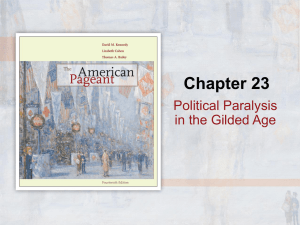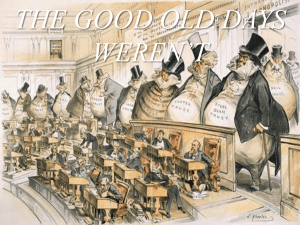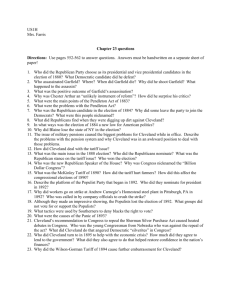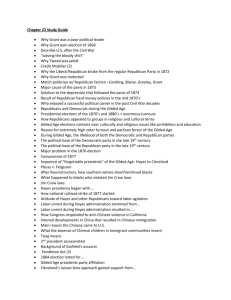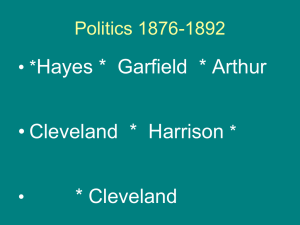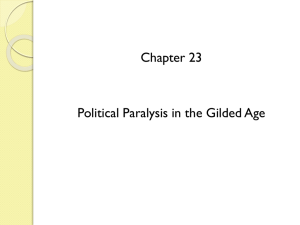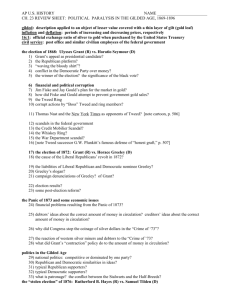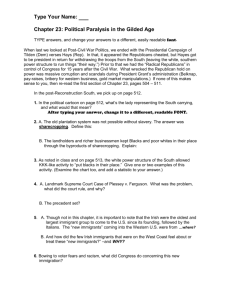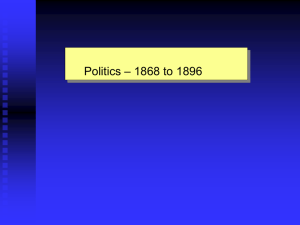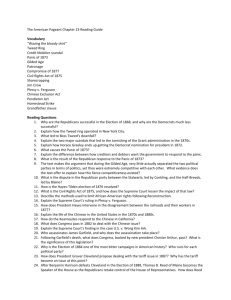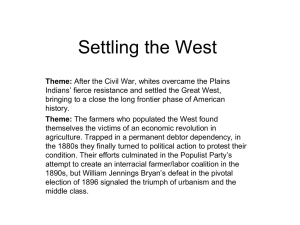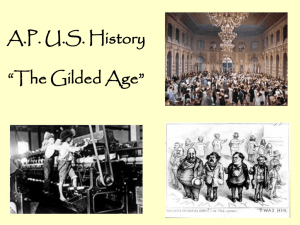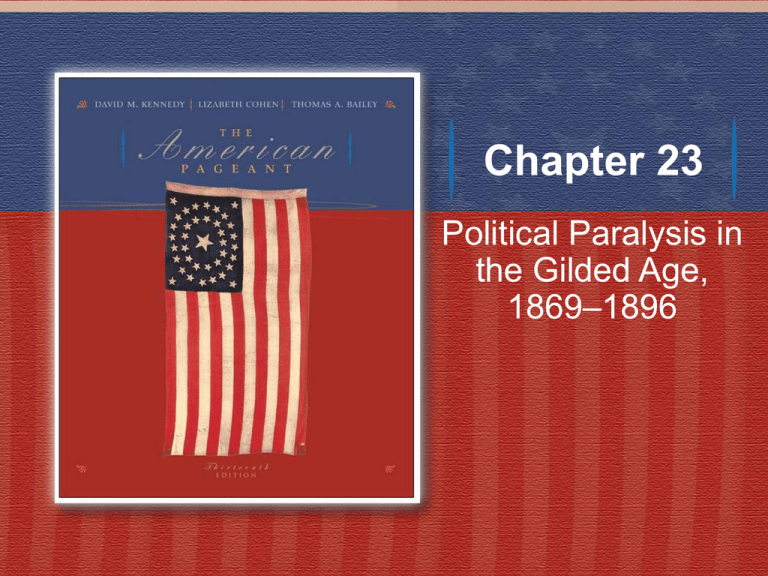
Chapter 23
Political Paralysis in
the Gilded Age,
1869–1896
Can Greeley and the Democrats “Swallow” Each Other, 1872
This cartoon by Thomas Nast is a Republican gibe at the forced alliance between
these former foes. General W. T. Sherman wrote from Paris to his brother, “I feel
amazed to see the turn things have taken. Grant who never was a Republican is your
candidate; and Greeley who never was a Democrat, but quite the reverse, is the
Democratic candidate.”
The Granger Collection
Paper Broadsides for the 1876 Election
Then, as now, the parties printed voting instructions to encourage citizens to vote the
straight party line.
Collection of Janice L. and David J. Frent
Hayes-Tilden Disputed Election of 1876 (with electoral vote by state)
Nineteen of the twenty disputed votes composed the total electoral count of
Louisiana, South Carolina, and Florida. The twentieth was one of Oregon’s three
votes, cast by an elector who turned out to be ineligible because he was a federal
officeholder (a postmaster), contrary to the Constitution (see Art. II, Sec. I, para. 2).
Copyright (c) Houghton Mifflin Company. All Rights Reserved.
Weighing Cotton
Cotton pickers who once toiled under the lash as slaves now worked for wages as
sharecroppers, but they were still beholden to the plantation owner. At this “weigh up,”
the “Boss Man” carefully calculates his profit as each hamper is filled, while the
sharecroppers await their meager payment.
National Archives
The First Blow at the Chinese
Question, 1877
Caucasian workers, seething with
economic anxiety and ethnic prejudice,
savagely mistreated the Chinese in
California in the 1870s.
Courtesy of University Archives, Bancroft Library, University of California, Berkeley
Chinese Butcher Shop, San Francisco, alifornia, c. 1890
By 1890, more than 100,000 Chinese immigrants lived in the continental United
States.
Courtesy of University Archives, Bancroft Library, University of California, Berkeley
Civil-Service Employment
The total number of civil-service jobs
has remained relatively stable since the
1950s, even as the government has
expanded in size and budget. The
decline in Classified Civil-Service jobs
(those subject to competitive
requirements) in the last three decades
reflects the changes mandated by the
Postal Reorganization Act of 1971,
which moved U.S. Postal Service
employees from competitive to
excepted service.
Source: U.S. Office of Personnel Management.
Little Lost Mugwumps Who Had Gone Astray
James G. Blaine, depicted as Little Bo Peep, tries to woo the errant Mugwump
reformers back into the Republican fold in 1884.
The Granger Collection
Presidential Election of 1884 (with electoral ote by state)
After a contentious and negative campaign, Grover Cleveland, the sitting governor of
New York, became the first Democrat elected to the office of the Presidency since
James Buchanan, before the start of Civil War.
Copyright (c) Houghton Mifflin Company. All Rights Reserved.
Grover Cleveland (1837–1908)
A strong supporter of civil-service reform and tariff reduction, President-elect
Cleveland was also the country’s most eligible bachelor. In this cartoon of 1884, he is
shown struggling to avoid office seekers on the one side and potential mothers-in-law
on the other.
Library of Congress
President Harrison Disposes of
Surplus, 1892
After four years out of office under
Cleveland, the Republican controlled
Congress yearned to make up for lost
time by spending heavily and rewarding
the faithful. Between Republican
president Benjamin Harrison and
forceful Republican Speaker of the
House Thomas Reed, 1890 saw
Congress pass the first billion-dollar
budget.
Public domain
Cornhusking
Hard-working farmers like the Krueger family, pictured in Wisconsin around the turn of
the century, sought relief from their heavy debt burdens in the 1890s by clamoring for
various inflationary schemes, including the monetization of silver.
Wisconsin Historical Society
The Homestead Strike, 1892
Three hundred armed Pinkerton
detectives floated on barges down the
Monongahela River to the site of the
Carnegie steel plant at Homestead,
Pennsylvania. Met by a defiant and
disciplined force of strikers, they were
compelled to surrender. Here the
Pinkerton men are shown disembarking
from their barges after their capitulation,
while the jeering strikers ashore exult in
their victory.
© Bettmann/ CORBIS
The Kansas Legislature, 1893
Rifle-bearing Populists seized the Kansas capitol after the election of 1892 to make
good their claim that they had won at the polls. Republicans disagreed and eventually
prevailed when sergeants at arms, shown here, restored order.
Kansas State Historical Society

